

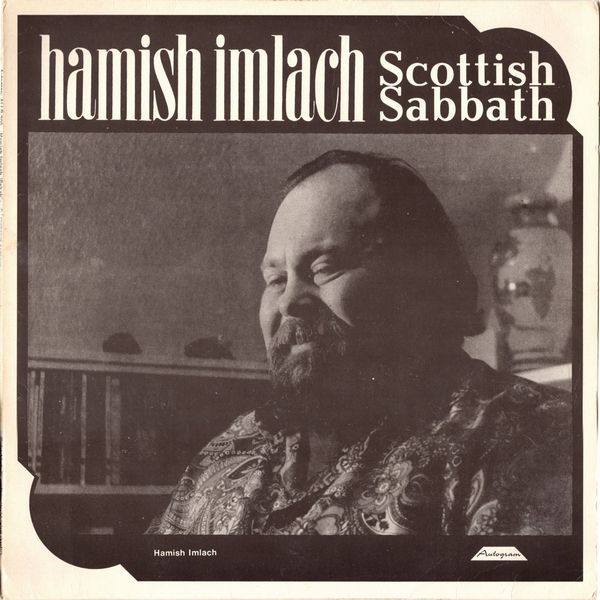 |
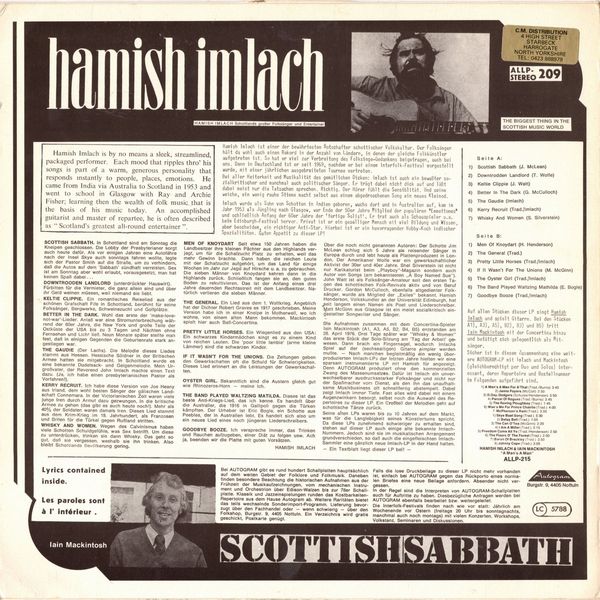
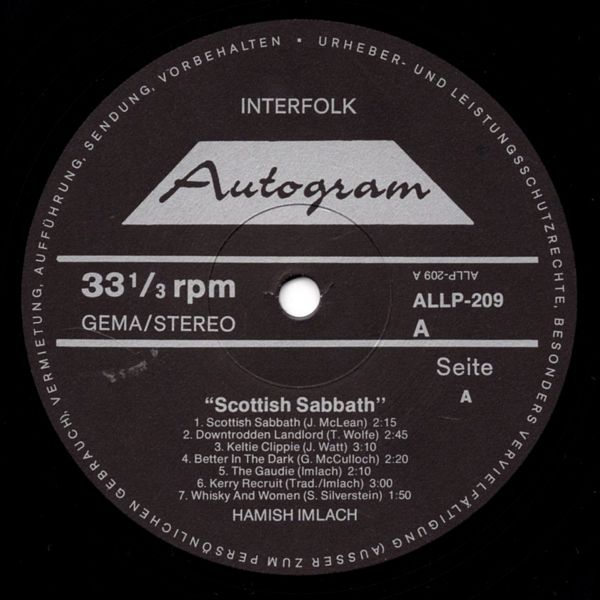
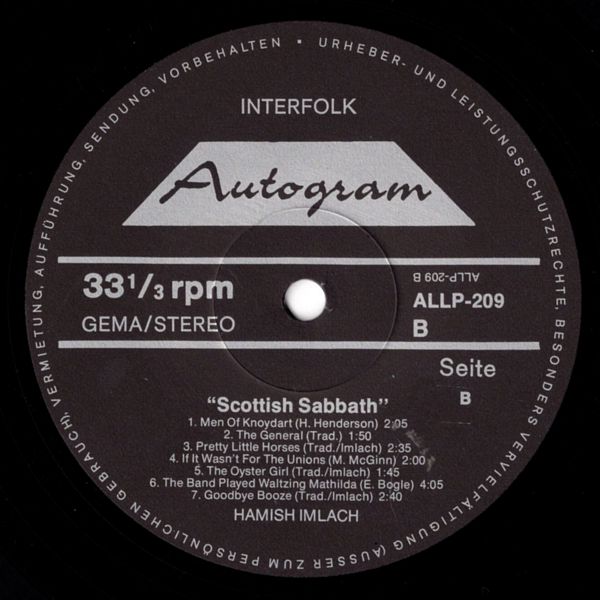 |
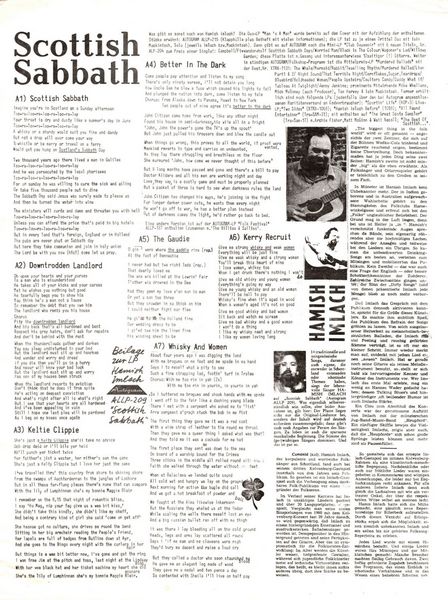
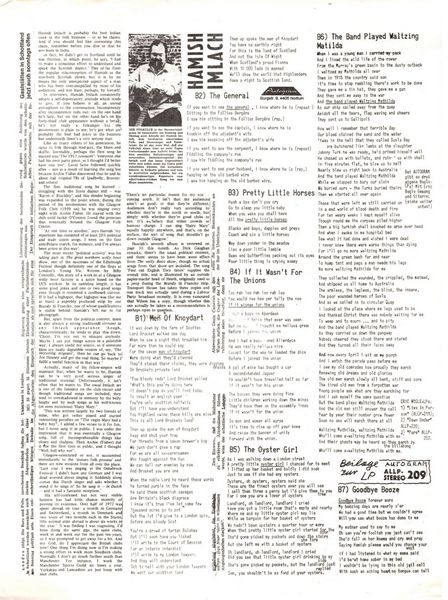 |
Sleeve Notes
Hamish Imlach is probably the best Indian cook in the folk business — or so he claims. And if you should feel like contesting this claim, remember before you dive in that he was born in India.
In fact, he didn't get to Scotland until he was thirteen, at which point, he says, 'I had to make a conscious effort to understand and speak the Scottish dialect.' This is far from the popular misconception of Hamish as the true- born Scottish clown, but it is by no means the only unexpected aspect of a man who has been over- simplified by most of his audiences, and not least, perhaps, by himself.
In interviews, Hamish Imlach consistently adopts a self- deprecatory attitude which tends to give, if you believe it all, an unreal atmosphere to the conversation. Inconsistency after inconsistency rolls out: on the one hand he's lazy, but on the other hand he's on his forty- third club appearance without a break; he's not really a folksinger but the involvement is plain to see. he's got what are probably the best bad jokes in the business but underneath there's a very serious man
Like so many others of his generation, he came to folk through trad- jazz, the blues and skiffle. Inevitably, perhaps the first song he learned was 'The 1913 massacre': 'everyone else had his own party piece, so I thought I'd better have one too'. Local fame followed quickly after — not as a result of learning the song but because Archie Fisher discovered that he and he alone had original 78s of Leadbelly, Broonzy and others!
The first traditional song he learned — struggling with the Scots dialect still — was 'Baron o' Brackley', and this slender beginning was expanded to the point where, during the period of his involvement with the Glasgow Folk Club (1959 on) he was singing every night with Archie Fisher. He stayed with the club until Jackie O'Connor found the premises that eventually housed the Glasgow Folk Centre.
'At one time or another,' says Hamish 'my repertoire has consisted of at least 25% political and trade union songs. I went on the first anti- Polaris march, for instance, and I've always been active in this way'.
The most recent 'political activity' was his taking part in The great northern welly hoot show, one of the successes of the Edinburgh Festival though definitely one of the flops at London's Young Vic. Written by Billy Connolly, this story of a work- in at a Glasgow welly boot factory is a satire based on the UCS work- in. In its rambling length, it has some good jokes and one or two good songs even though it remained a cardboard cut- out. If it had a highspot, that highspot was (for me at least) a superbly produced strip by one Brandy di Francko, one of whose qualifications is visible behind Hamish's left ear in the photograph.
But, apart from the political content, there is also always a strong traditional element in any Imlach appearance though, characteristically, he tends to play this down. 'Christ, I'm not out to educate anybody. Maybe I can put things across in a palatable way I always credit my source, so if someone likes my easily digestible version of, say, 'The recruiting sergeant', then he can go back to Joe Heaney and get the real thing. So maybe I fulfil a useful function in that way.'
Actually, many of his fellow- singers will maintain that, when he wants to be, Hamish can be a very good serious singer of traditional material. Unfortunately, it isn't often that he wants to. The usual Imlach set is one of the funniest on the club circuit and though traditional songs are included, they tend to overshadowed in memory by the belly laughs and by such songs as his well- known (or even notorious) 'Hairy Mary.'
'This was written largely by two friends of mine, who got rather pissed and started concocting parodies on "The virgin Mary had a baby boy", I added a few verses to it for fun, but I never sang it in public. I was under the impression that it was essentially a Glasgow song, full of incomprehensible things like closes and cludgies. Then Archie (Fisher) did it for the first time in public, and I thought "Well, hell why not".
Glasgow- orientated or not, it succumbed immediately to the 'instant folk process' and there are now versions from all over the place. 'Last year I was singing at the Osnabruck Festival. I didn't have any German and I was dead worried about singing it. Suddenly along comes this Dutch singer and asks whether I mind if he sings it! So he sang it — in Dutch and it had a fantastic reception.'
His self- confessed but not very visible laziness has had little chance recently of proving its existence. Over half of 1972 was spent abroad on tour: a month in Germany and Switzerland, a month in Denmark and two tours of two months each in the States. (His normal stint abroad is about six weeks it the year.' 'I was finding I was stagnating. I'd! been doing the same gigs, the same clubs, week in and week out for the past ten years, so I was prompted to get away for a bit. And my God, do I appreciate the British clubs now! One thing I'm doing now is I'm making a strong effort to work more Southern clubs. Normally I don't go much further south than Manchester. For instance, I work the Manchester Sports Guild six times a year. Yorkshire and Lancashire are just lousy with nice clubs.
There's no particular reason for my not coming south. It isn't that the audiences! aren't so good, or that they're different. Audiences don't really vary according to whether they're in the north or south, but! simply with whether they're good clubs or not. It's a fallacy that either crowds or humour change. I can sing 'Hairy Mary' equally happily anywhere, and that's, on the surface, the sort of song that shouldn't go down outside Glasgow.'
Hamish's seventh album is reviewed on page 30 this month. As Dick Gaughan remarks, there's the usual political content, and there seems to have been some effect from The welly Boot show, though no actual songs from that show are included. The song 'Fine old English Tory times' supplies the overall title, and is illustrated by an outside papier- maché head of Heath, originally used as a prop during the Brandy di Francko strip. Transport House has taken three copies and one track was actually used during a Labour Party broadcast recently. It is even rumoured that Wilson has a copy, though whether this can actually be taken as a recommendation is perhaps open to question.
Hamish Imlach is by no means a sleek, streamlined, packaged performer. Each mood that ripples thro' his songs is part of a warm, generous personality that responds instantly to people, places, emotions. He came from India via Australia to Scotland in 1953 and went to school in Glasgow with Ray and Archie Fisher; learning then the wealth of folk music, that is the basis of his music today. An accomplished guitarist and master of repartee, he is often described as "Scotland's greatest all-round entertainer".
Hamish Imlach is one of the most trusted ambassadors of Scottish folk culture. The folk singer probably holds a record for the number of countries in which the same folk artist has performed. So he contributed a lot to spreading the Folksinge idea, also with us. Because it has been represented in Germany with an annual extensive tour since 1969, after it was presented at an Interfolk Festival.
With all the cheerfulness and musicality of the cozy fat man: Imlach is also a consciously socially critical and sometimes also a political singer. In doing so, he does not apply too much and usually only lets the facts speak for themselves. Right. The listener feels the sensitivity. And his soft, a little rough voice turns even a hackneyed song into a new gem
Imlach was born to Scots in India, grew up there and in Australia, came to Glasgow as a youth in 1953, was a member of the popular "Emmettones" in the late 1950s and finally the 'finished soloist' in the early 1960s. He also appeared as an actor at the Edinburgh Festival among others. In his private life he is a sociable person with a lot of education and knowledge, but modest, a real anti-star. He is an excellent hobby cook of Indian specialties. Enjoy your meal with this LP!
SCOTTISH SABBATH — In Scotland, pubs are closed on Sundays. The Presbyterian lobby continues to do that today. When a few years ago a car ferry wanted to go to the Isle of Skye on Sundays too, Pastor Smith lay down on the street to prevent the cars from sinfully traveling on the Sabbath. But sex is probably allowed on Sunday, provided you don't have fun with it …
DOWNTROODEN LANDLORD — Intercession for the landlords who are all alone and cry over their money because nobody loves them.
KELTIE CLIPPIE — A romantic travel song from beautiful County Fife in Scotland, famous for its folk singers, mines, pig breeding and golf courses.
BETTER IN THE DARK — Probably the first of the 'make love not war' songs. The reason was a power failure during the 1960s, which left New York and large parts of the east coast of the USA without television and lights for up to 3 days and nights. Nine months later it was found that in some areas the birth rate had risen sharply.
THE GAUDIE (The Salmon) — The melody of this song comes from Hessen. Hessian mercenaries in the British Army had brought them with them. In Scotland it became a well-known bagpipe and violin tune. My great-grandfather, the Reverend John Imlach wrote a text about it. (Yes, I have an ancestral Presbyterian pastor!).
KERRY RECRUIT — I have this version of Joe Heany from Ireland, arguably the best singer in the Connemara Gaelic landscape. In Victorian times, poverty forced many young Irish people to join the British Army (it still exists today!). More than 40% of the soldiers were Irish at the time. This song comes from the Crimean War in the 19th century, when the French and British fought for Turkey against Russia.
WHISKEY AND WOMEN — Because of Calvinism, many Scots feel guilty about sex. To suppress this, they then drink whiskey. It works so well that they forget why they are drinking it. So Scotland's population remains small.
MEN OF KNOYDART — For about 150 years the landowners have chased their small tenants out of the Highlands to make room for sheep breeding because that brought more profit. Then the rich people stopped breeding sheep and went around the country for a few weeks to hunt deer and other things. to use. The seven men of Knoydard then return to the Highlands. Eventually they start to recultivate the good soil. This is the beginning of a three year legal battle with the landowner. Of course the seven men lose.
THE GENERAL — A song from WW1. Allegedly the poet Robert Graves wrote it in 1917. I got my version from an old man in a pub in Motherwell, where I live. Mackintosh also plays the bass concertina here.
PRETTY LITTLE HORSES — A lullaby from the USA: a black nanny sings it to a child of rich people. The poor little lambie are the black children.
IF IT WASN'T FOR THE UNIONS — The newspapers often blame the unions for trouble. This song recalls the achievements of the trade unions.
OYSTER GIRL — It is well known that oysters are as good as rhinoceros horn — I mean.
THE BAND PLAYED WALTZING MATILDA — This is the best anti-war song I know. It is about the Australians who fought the Turks in Gallipoli in 1916. The author is Eric Bogle, a Scotsman from Peebles who lives in Australia. So it's a new song by a younger songwriter.
GOODBYE BOOZE — I always promise to quit drinking, smoking, dieting, etc. Oh, let's end the record with good intentions.
About the authors not yet named: The Scot Jim McLean made his way through Europe as a traveling singer for 5 years and now lives as a record producer in London. The American Wolfe was a union activist in the 1930s and 1940s. Shel Silverstein is not only a cartoonist for "Playboy" magazine but also a songwriter (best known for "A Boy Named Sue"). John Watt has been an amateur folk singer since the first days of the Scottish folk revival and has been a printer by profession. Gordon McCulloch, also a veteran folk singer, became known as a member of the "Exiles". Hamish Henderson, folklorist at Edinburgh University, has long been a name as a poet and songwriter. Matt McGinn from Glasgow is a mostly socially critical songwriter and singer.
The recordings with the concertina player Iain Mackintosh (A1, A3, A5, B2, B4, B5) were made on April 28, 1976. Three days later, "Whiskey & Women "was the first piece of the solo session on the day of work". Then a fingernail broke, which made Imlach's playing on the (six-string) guitar easier. After some Imlach LPs that were a little over-produced in recent years, we thought a sparingly orchestrated LP with Hamish was advisable. Because AUTOGRAM produces without the commercial constraint of mass sales. On the other hand, Imlach is an unmistakable, expressive folk singer and not just the joker on duty, as the unstoppable music business often quickly labels him. Imlach always shows depth. Almost everything is taken care of with a wink, even the selection of the repertoire for this LP. Much of the melodies are based on Scottish dances.
His old LPs were on the market for up to 10 years, which speaks for the longevity of his artistry. Since these LPs are getting more and more difficult to obtain, there are also some old, well-known Imlach numbers on this LP. However, their musical arrangement is fundamentally different, so that even the die-hard Imlach collectors hold a completely new Imlach LP in their hands. A text sheet is included with this LP!
Much of above was translate from German vie Google Translate.